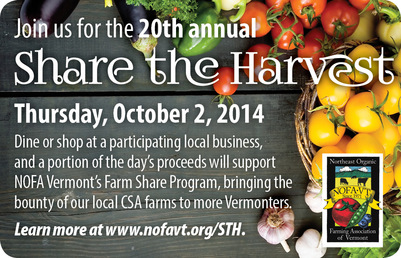
 We hope you'll join us on Thursday for Share the Harvest! Just dine or shop at a participating business on October 2, and a portion of the proceeds will benefit NOFA Vermont's Farm Share program, which helps limited-income families afford CSA shares from local farms, including ours! Over 70 businesses are participating statewide, including several Middlebury restaurants and the Middlebury and Rutland co-ops. Treat yourself, or just get your groceries, and help make local, organic food available to all. (You can also make a direct donation, if you feel so inclined.)
0 Comments
 We're happy to announce that sign-up for our late fall CSA is now open! The fall CSA starts the first week of November and will run through the week before Christmas, for a total of seven weeks of yummy fall and winter veggies for $200. We'll have both storage crops - potatoes, beets, carrots, onions, garlic, a variety of winter squash, parsnips, etc. - and fresh vegetables like Brussels sprouts, spinach, broccoli, braising greens, and more! We're accepting both on-farm and delivery shares, with drop-off locations in Middlebury and Rutland. The share is a medium-to-large size, which we recommend for 2-4 people. However, since many of the vegetables at that time of year are storage crops, the share is also appropriate for individuals or couples who have some storage capacity and would like to have extra for the later months. (Or, of course, for those who eat an above-average amount of veggies.) Check out the CSA page for more info and to sign up -- and as always, get in touch with any questions! We're excited to be hosting a NOFA-VT pizza social on the farm in about a month. Mark your calendars for September 4, from 5:30–7:30. We'll be doing a field tour, telling a little about our history, and enjoying some delicious, wood-fired pizza with toppings from the farm. This is a great opportunity for CSA delivery folks and market customers to come see where their veggies come from - everyone is welcome!
You can RSVP through NOFA-VT here (plus check out their other workshops and summer socials). They're requesting a $5 donation to cover the costs of the oven, and we'll also have a donation box available to help support our Farm Share fund. We hope to see you there! There may be arguments over what diet is best for human health, but everyone agrees that vegetables are a key part. Something we often hear from new CSA members is that they didn’t realize how much they weren’t eating vegetables until faced with a steady supply each week. (Our large share typically contains 6-8 veggies, which is pretty much one a day - with Federal guidelines suggesting 5 servings daily and many parties recommending more, it can be a wake-up call to realize how challenging it is to get even one or two servings!)
In our household, perhaps unsurprisingly, we tend to eat a lot of vegetables. One way, of course, is to just eat them straight - smashed potatoes, roasted broccoli or cauliflower, salads of all kinds. But I’ve also trained myself to pause throughout the meal preparation process and ask, "How can I get more veggies in this?" Herbs and garlic scapes in scrambled eggs or sauteed greens alongside eggs over-easy. Kale smoothies are a real thing (though I like spinach better) - frozen in popsicle molds, they’re a no-fail way to get some veggies in kids. Lettuce and herbs tucked into sandwiches and wraps, broccoli in mac ’n’ cheese, carrots grated into hamburgers, spinach chopped into pasta sauce. It is the rare soup not improved by a few handfuls of torn greens added at the end. We make a lot of one-pot sautes (like our recent beet greens and sausage recipe), and those are an endlessly flexible way to incorporate lots of vegetables into a main dish. Few recipes are so delicately balanced that you couldn't add another vegetable of some sort at some point. Finding some vegetable snacks you like is a help, as well. It all adds up! (Check out our summer saute master recipe!) 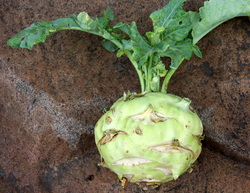 Kohlrabi is currently my favorite vegetable. It's in the cabbage family - in fact, along with broccoli, cauliflower, Brussels sprouts, and kale, it is the same species as cabbage! It's been bred for a big fat round stem, which is the part most-used, though the leaves are edible, too. The outer skin gets peeled off, and the interior is crisp, juicy, and both sweet and a bit peppery. The flavor is similar to mild radishes, salad turnips, or the stem of a broccoli. Definitely a cabbage relative. (Sonora calls it a cabbage-apple.) I've been hassling Jeremy for years to grow this plant, and this is the first year that he gave in. (He thought he didn't like it.) Turns out that it grows well, and - though many people don't know it - we've been sampling it at the market, and most folks are pretty excited once they find out how yummy it is. We like it best raw - sliced into salads, alone or mixed with cabbage in a slaw, or just dipped in hummus or ranch dressing. However, we've heard good things about it cooked in fritters, roasted, grilled, and even boiled and mashed like a potato. In the fall we might add it to a dish of roasted veggies. If you have a favorite turnip or rutabaga recipe, it would probably sub pretty well. I'm planning to pickle some in the coming weeks. If you've got a favorite kohlrabi recipe, let us know! 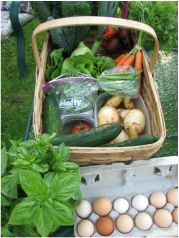 Before it gets buried in the rest of what I want to say, here's the core: We have community members who would like to take part in our CSA but can't afford to -– but you can change that! If you are able, please donate to the NOFA Vermont Farm Share program and help us make our food available to everyone. Enter any amount, choose Farm Share Program, and designate Gildrien Farm. It's a tax-deductable donation and it will make a huge difference in the life of a local family this summer. (Read on or click here to learn more about Farm Share.) If five people donate $25 each, a family that otherwise couldn't afford our CSA will be able to join. Can you help? Now, the rest: One of the major complaints leveled against the local & organic foods movement is that those foods are expensive. The truth of that charge varies depending on exactly what products one compares: organic processed food (cookies, cereal, etc) is often more expensive than conventional counterparts, but organic produce in season at the farmers' market is often cheaper than conventional in the grocery store. (It's true.) Buying through a CSA, like ours, is generally an even better deal, since most CSAs, like ours, give a 10-15% discount on the product as a "thank you" for the early investment. That early investment itself can be a challenge for many families, however. Even if you know you'll be saving money in the long run (and eating well, and, perhaps, getting to know a local farmer personally), coming up with a season's worth of grocery money in one lump might be out of reach. We do offer a payment plan, to help mitigate that burden. But we also want good food - fresh, healthy, local, organic food - the food we raise - to be accessible to everyone in our community. A payment plan doesn't help if you simply can't afford the cost at all. As a family who have ourselves been on food stamps, we get it. Calorie for calorie, junk food is usually cheaper. The fact that cheap food is artificially cheap (and, for that matter, usually artificially food) doesn't change the fact that it is more affordable, especially when time is as tight as money. (If you counting nutrients instead of calories, or if you are able to prepare most of your meals from scratch, the equation changes – but it also gets a lot more complicated.) All of that is why we believe and participate in NOFA Vermont's Farm Share Program. Farm Share works by gathering community donations - raised by the farm (like this right here) and by NOFA during the annual Share the Harvest fundraiser. Limited-income Vermonters apply and are matched with a local farm. They pay half the cost of the CSA, the farm-raised donations pay one quarter, and the NOFA-raised donations pay the other. It's really a phenomenal solution - people in need get access to good food, local farms get new customers. At times, we've had up to a third of our membership participating through Farm Share, but we need the community's support to make it work. Can you donate $25 and make a season of local, organic food possible for a local family? Are you dreaming of summer yet? Put a deposit down on this summer's enjoyment by signing up for a CSA now!
We've got a few new developments for the CSA this year, which we're pretty excited about. We're adding some new produce to the mix, including fennel, sweet corn, and strawberries. We've also partnered with several farmer friends to make meat, cheese, bread, eggs, and honey available to our subscribers. (See the CSA page for more details.) For folks who pick up on the farm, we're expanding the "market style" pick-up that we trialled with the Winter CSA into the summer. We got really good feedback about this system, which gives you a bit more variety and control over what you take home each week. We'll have a few tables set up with several types of produce on each, and you'll be able to choose what you want from each table. (Some items, like early tomatoes, will still be distributed more tightly to make sure everyone gets their share.) We're also expanding our workplace delivery program to reach more businesses between Rutland and Vergennes. Those who get deliveries will have traditional set boxes -- but they will get them delivered directly to their place of work! If you think some of your coworkers might be interested in a CSA, let us know! We are happy to talk to HR or office managers about the program and how we can make it work best for your business or organization. If you have any questions, please get in touch. 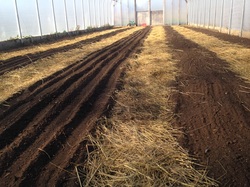 December is here, but we are still farming! We've been seeding greens, carrots, turnips, and radishes, with an eye towards the early spring; the seeds should just sprout in the next weeks, then hold during the dark and cold of deep winter, to start growing again in late February and March. Our winter sales this year were much higher than we'd expected; we've sold out of nearly all our storage crops except onions and winter squash and what we're saving for CSA. We planted twice as many potatoes this year over last, and next year we'll be planting even more. Same with carrots, beets - even our parsnips are nearly sold out! It's a great sign of the maturation of the local foods movement - for farmers and consumers both - that winter demand is growing. No longer must localvores follow the plenty of summer with turnips all winter - though winter's pickings are certainly slimmer than August's, there is a huge increase in variety and quality over what was available several years ago. On our own farm, we were excited to be able to provide food for our neighbors for an additional two months this year with our Winter CSA and at the farmers' market, and hope next year to expand our winter growing even more. This Thanksgiving week, we're grateful for so much: a healthy, happy family, first and foremost; a strong community of friends where we can find support, understanding, and last-minute babysitting; a solid network of fellow farmers, where we can find advice and used equipment; good soil; a new pond; a great preschool; and on this coldest morning of the year, a blazing wood-stove to combat the drafty breezes in our 200-year-old house.
And of course, we are grateful for all of you: CSA members and market customers, neighbors and friends, folks who stop by the farm to help or root for us from afar. Without you - and all the people all over the state and country who are helping to rebuild local food systems, who are willing to invest in small farms like ours, week by week and season by season - we'd never be able to be living this dream of ours. So, thanks. And we hope your Thanksgiving is as full as ours. A good hard freeze this morning seems like a fitting kickoff to the first week of our first Winter CSA. The CSA will run for seven weeks, with an extra-big share for Thanksgiving and another one at the end as a send-off. We're pretty pleased with the offerings we've got lined up - lettuce, spinach, arugula, kale, beets, carrots, potatoes, sweet potatoes, parsnips, winter squash of several sorts, pea shoots, dry beans, onions, garlic, cauliflower, broccoli, and right now we still have tomatoes and peppers. We're still seeding greens for the late winter, some of which we're planning to have in the very early spring when the winter farmers' market opens up again in March. All in all, we're pretty happy with how the winter growing season is looking.
At home, we've been getting into the winter routines - splitting kindling, simmering soup. This method of "perpetual broth" in the slow cooker has been pretty amazing for us - if you've got vegetables in the house (which we and, we hope, our CSA members, always do) a pot of hot broth means that you're only ever a few minutes away from a satisfying meal. Just chop up some carrots/potatoes/sweet potatoes/beets/broccoli/cauliflower/etc, saute an onion and garlic if you've got time, add the broth and leftover rice or meat or beans or mashed potatoes or squash, whatever is to hand and seems good. We freeze whole tomatoes in the summer, and they're perfect for soup like this. Simmer for a few minutes, throw in a handful of greens at the end, some salt and a dash of lemon juice, and there you go! A cup of broth is also a good holdover when dinner is only half an hour off but kids are hungry now - nourishing without being too filling for too long. We hope that you're easing into the new season with pleasure and look forward to seeing you soon! |
Follow us on Facebook for more updates! Archives
March 2016
Categories
All
|

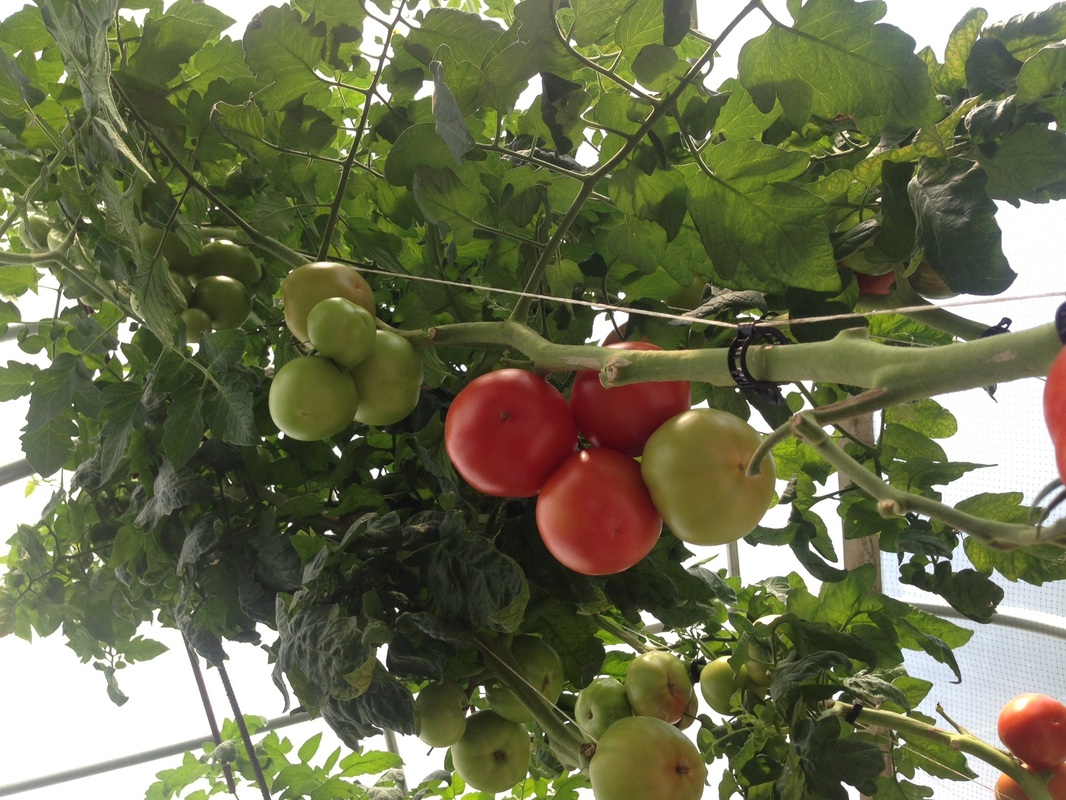


 RSS Feed
RSS Feed
